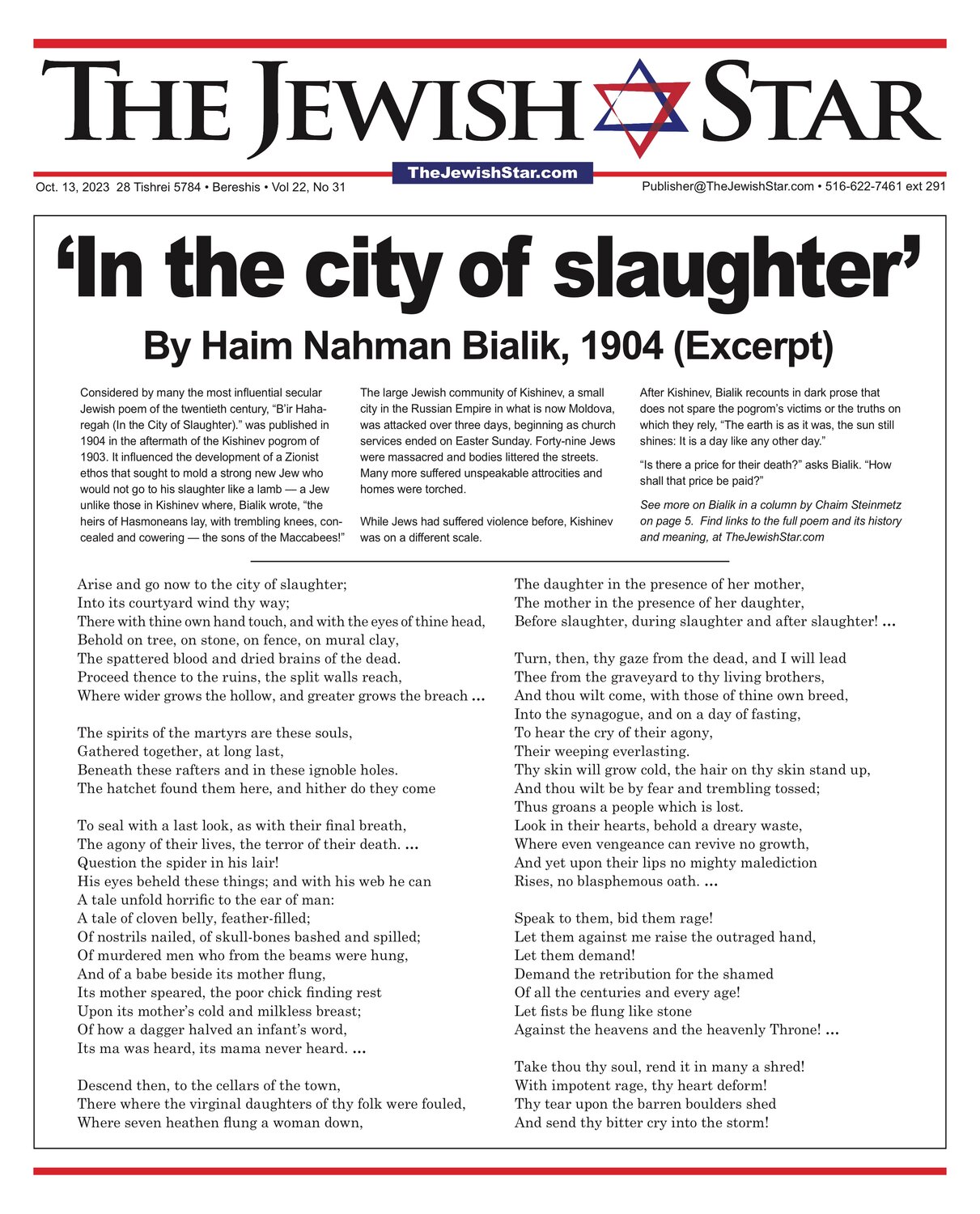'In the city of slaughter' (1904)
'B'ir Haharegah' by Haim Nahman Bialik
Considered by many the most influential secular Jewish poem of the twentieth century, “B’ir Haharegah (In the City of Slaughter).” was published in 1904 in the aftermath of the Kishinev pogrom of 1903. It influenced the development of a Zionist ethos that sought to mold a strong new Jew who would not go to his slaughter like a lamb — a Jew unlike those in Kishinev where, Bialik wrote, “the heirs of Hasmoneans lay, with trembling knees, concealed and cowering — the sons of the Maccabees!”
The large Jewish community of Kishinev, a small city in the Russian Empire in what is now Moldova, was attacked over three days, beginning as church services ended on Easter Sunday. Forty-nine Jews were massacred and bodies littered the streets. Many more suffered unspeakable attrocities and homes were torched.
While Jews had suffered violence before, Kishinev was on a different scale.
After Kishinev, Bialik recounts in dark prose that does not spare the pogrom’s victims or the truths on which they rely, “The earth is as it was, the sun still shines: It is a day like any other day.”
“Is there a price for their death?” asks Bialik. “How shall that price be paid?"
• • •
The excerpts published on The Jewish Star's cover follow the links below.
Use these links to connect to the full poem and its history and meaning:
•A backgrounder on Russian pogroms, Bialik, and his poem, from Encyclopedia dot com
•VIDEO: What Happened in Kishinev?
•From Your Krav Saga Blog (By Moshe Katz)
•Excerpt from a column by Rabbi Chaim Steinmetz
• • •
'In the city of slaughter' ('B'ir Haharegah"), 1904, Excerpt
Arise and go now to the city of slaughter;
Into its courtyard wind thy way;
There with thine own hand touch, and with the eyes of thine head,
Behold on tree, on stone, on fence, on mural clay,
The spattered blood and dried brains of the dead.
Proceed thence to the ruins, the split walls reach,
Where wider grows the hollow, and greater grows the breach …
The spirits of the martyrs are these souls,
Gathered together, at long last,
Beneath these rafters and in these ignoble holes.
The hatchet found them here, and hither do they come
To seal with a last look, as with their final breath,
The agony of their lives, the terror of their death. …
Question the spider in his lair!
His eyes beheld these things; and with his web he can
A tale unfold horrific to the ear of man:
A tale of cloven belly, feather-filled;
Of nostrils nailed, of skull-bones bashed and spilled;
Of murdered men who from the beams were hung,
And of a babe beside its mother flung,
Its mother speared, the poor chick finding rest
Upon its mother’s cold and milkless breast;
Of how a dagger halved an infant’s word,
Its ma was heard, its mama never heard. …
Descend then, to the cellars of the town,
There where the virginal daughters of thy folk were fouled,
Where seven heathen flung a woman down,
The daughter in the presence of her mother,
The mother in the presence of her daughter,
Before slaughter, during slaughter and after slaughter! …
Turn, then, thy gaze from the dead, and I will lead
Thee from the graveyard to thy living brothers,
And thou wilt come, with those of thine own breed,
Into the synagogue, and on a day of fasting,
To hear the cry of their agony,
Their weeping everlasting.
Thy skin will grow cold, the hair on thy skin stand up,
And thou wilt be by fear and trembling tossed;
Thus groans a people which is lost.
Look in their hearts, behold a dreary waste,
Where even vengeance can revive no growth,
And yet upon their lips no mighty malediction
Rises, no blasphemous oath. …
Speak to them, bid them rage!
Let them against me raise the outraged hand,
Let them demand!
Demand the retribution for the shamed
Of all the centuries and every age!
Let fists be flung like stone
Against the heavens and the heavenly Throne! …
Take thou thy soul, rend it in many a shred!
With impotent rage, thy heart deform!
Thy tear upon the barren boulders shed
And send thy bitter cry into the storm!

 57.0°,
Mostly Cloudy
57.0°,
Mostly Cloudy 




